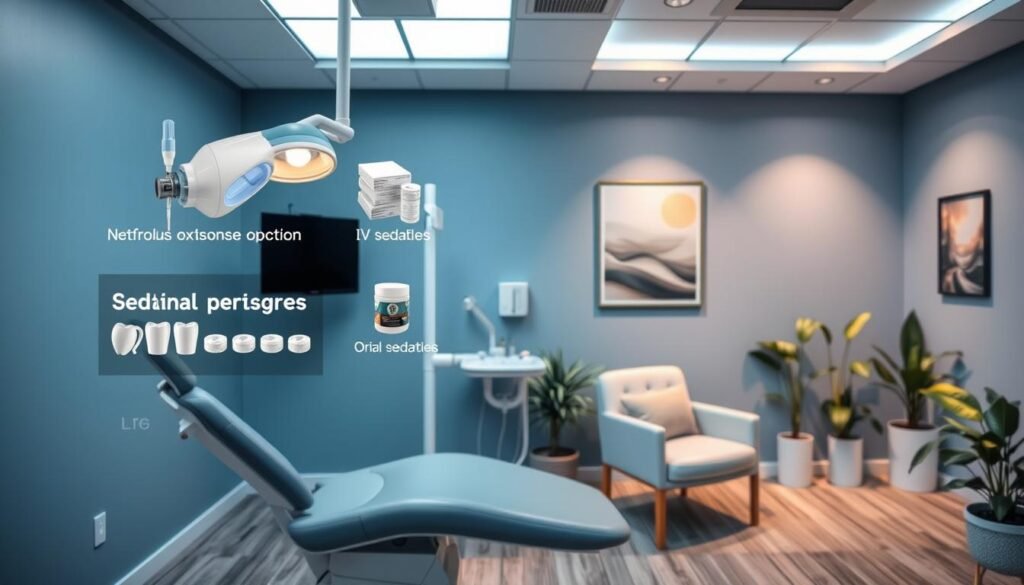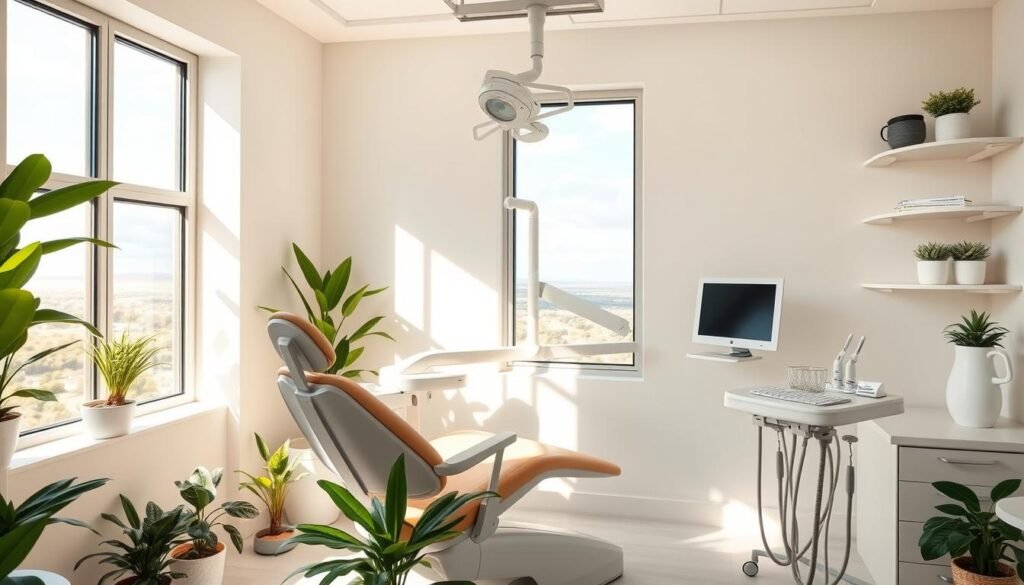Dental anxiety is a big issue for almost 60% of adults in the United States. This fear leads to skipping important dental check-ups and cleanings. As a result, the risk of getting gum disease and tooth decay goes up. Surprisingly, between 10% to 20% of people are so anxious that they avoid going to the dentist altogether. This can turn small problems into big health issues. Also, bad oral health is linked to serious conditions like heart disease and lung problems. This shows why it’s essential to face dental anxiety. This article will share powerful ways to deal with dental anxiety. By using these methods, you can take better care of your oral health confidently.
Key Takeaways
- Nearly 60% of adults experience dental anxiety, affecting their oral health.
- Avoidance of dental care due to anxiety can lead to severe health issues.
- Coping strategies, such as communication and relaxation techniques, can significantly reduce anxiety.
- Sedation dentistry offers options like nitrous oxide and IV sedation for anxious patients.
- Building a trusting relationship with one’s dentist is crucial for managing dental anxiety.
Understanding Dental Anxiety
Around 36% of people feel dental anxiety, and 12% have severe dental phobia. This fear comes from many triggers. Understanding these triggers is crucial for patients and dental professionals.
Common Triggers of Dental Anxiety
Negative past experiences are the main cause of dental anxiety for most patients. Certain things make this fear worse. Let’s look at what these triggers are:
- Distinct smells of the dental office make about 40% of patients anxious.
- The sound of the dental drill scares more than 50% of people.
- Visual stimuli related to dental work causes anxiety in 35–40% of patients, especially kids.
The Impact of Dental Anxiety on Oral Health
People with dental anxiety often skip or delay their dental care. This leads to worse oral health. They might only see a dentist in emergencies because they didn’t get treatment sooner. About 20% of those with serious dental anxiety choose sedation dentistry to help with their treatments. Surprisingly, over 70% feel calmer when their dental care providers reassure them before a visit.
Having a good experience at dental check-ups can lower anxiety in the future. Consistent, caring treatment during visits can change how people feel about dental care. Teaching patients and giving them control can reduce their anxiety by about 30%. This builds a stronger, more positive connection with dental care over time.
Recognizing Your Fear: The First Step to Overcoming It
Understanding your fear is crucial in dealing with dental anxiety. A high number, 36% of people, avoid the dentist because of fear. The reasons vary from the noise of instruments to bad past experiences.
About 12% of patients have dental phobia, a real mental health issue. It’s the fifth most common fear. A study found that 63% fear what they don’t know about dental visits. This shows how our minds play a big role in dental anxiety.
Facing dental fears starts with knowing what scares you. It could be the thought of pain or worry over your teeth’s health. Understanding these fears helps you deal with them. Then, you can get the dental care you need without making things worse.
Dental anxiety can actually increase pain and lead to worse dental problems. Avoiding the dentist means small issues can become big ones, costing more to fix. Recognizing your fear lets you try relaxation techniques and talk about your worries. Effective dental anxiety management starts with this recognition, making dental visits easier.
Initial Steps to Overcome Dental Anxiety
Taking the first steps to manage dental anxiety is key. It starts with recognizing and accepting your fear. Nearly 36% of people feel anxious about dental visits. This fear can lead to skipping important check-ups, risking oral health.
Importance of Acknowledging Your Anxiety
Understanding your anxiety is the first step towards getting better. It lets you talk openly with your dentist. Open conversations can help make dental visits more comfortable. Techniques like deep breathing can ease anxiety before appointments.
Not dealing with your anxiety can make dental visits harder. It’s vital to know what scares you and tell your dentist. People with dental fear often feel more pain than others. Regular dental visits can prevent issues like gum disease and tooth loss.
Effective Communication with Your Dentist
Good communication is key for a positive dental visit. It builds a strong connection between dentists and their patients. It lets patients share their worries freely.
A dentist who pays attention and talks clearly about treating dental fear can make a big difference. They help lower the patient’s nerves.
Building Trust and Rapport
Trust starts with open conversations. Patients should feel okay sharing their fears, like pain or bad past experiences. Dentists who listen well and show they understand can create a strong bond. This bond makes patients more likely to follow advice and be happy with their visits.
Establishing Clear Signals During Procedures
Using hand signals during treatment can help patients feel in charge. For example, they can raise their hand if they need a pause. This teamwork approach eases fear and builds trust. It makes dental visits less stressful for both the patient and the dentist.

To learn more on easing dental fear through good talk, check out the significance of dentist-patient chats. These methods guide both patients and dentists towards better understanding and care.
Relaxation Techniques for Managing Dental Anxiety
Many people get nervous about dental visits. This fear can make them skip important treatments. To help, various relaxation methods can reduce stress and help patients feel calmer. By learning these methods, visiting the dentist can become easier.
Deep Breathing Exercises
Deep breathing is a simple way to ease dental worries. The 4-7-8 technique is a good example. You inhale for four seconds, hold for seven, then exhale for eight. This helps slow down your heart, relax your muscles, and calm your nerves. It’s great for dealing with dental fears.
Visualization Strategies
Thinking of calm places can also lower your anxiety. Patients can think of a calm beach or a quiet forest. Imagining these peaceful scenes can take your mind off dental procedures. It helps you stay relaxed in the dentist’s chair.
The Role of Meditation and Mindfulness
Regular meditation and mindfulness have big benefits for dental anxiety. They help you stay focused on the present moment. This can make you less stressed about dental visits. Techniques like these help keep calm and view dental care more positively.
Distraction Techniques for a Calmer Experience
Many people feel scared when they visit the dentist, with up to 30% getting really anxious. Using good distraction methods can help calm this fear. These ways help people relax and make their time at the dentist better.
Using Music and Podcasts
Listening to music or interesting podcasts can take your mind off the dentist. Sounds of the tools, which are often scary, are less noticeable. Choosing favorite songs or a captivating podcast could cut anxiety by half. Lots of dental places encourage wearing headphones to focus on happier things instead of the dental work.
Exploring Virtual Reality Options
Virtual reality in dentistry is becoming popular because it really helps with anxiety. It makes you feel like you’re somewhere calm, taking your mind off the dental work. Some studies show virtual reality can ease anxiety by up to 70%. It’s especially helpful for those very scared of dental visits, making them feel calmer.
Distraction methods are great for easing dental fears, making visits more comfortable. Combining relaxing music with virtual reality experiences can make going to the dentist better. This lets people look after their teeth without being scared. For more tips, visit this resource.
The Benefits of Gradual Exposure to Dental Visits
Gradual exposure to dental visits helps people beat dental anxiety. This method lets you slowly get used to being at the dentist’s. You start with easy tasks and move to harder ones.
First, you might just take a look around the office. This easy step helps you feel less scared. Then, getting a regular cleaning further increases your comfort.
A study shows 85% of folks felt less anxious after these steps. This step-by-step plan gives you control. And finding the dentist’s visits okay leads to better dental health.
Mindfulness is key too. Doing meditation before seeing the dentist can cut stress by 60%. It doesn’t just ease fear; it also helps you relax physically, dropping your heart rate by 20 beats per minute.
So, gradual exposure helps by:
- Boosting confidence at the dentist.
- Cutting down fear with each positive visit.
- Making your bond with the dentist better.
- Lessening stress before and during appointments.
Using gradual exposure is a great way to beat dental anxiety. It leads to healthier teeth and a happier life.
Understanding Sedation Dentistry Options
If you’re nervous about going to the dentist, sedation dentistry can really help. It’s key to know the different ways you can be sedated to find the best one for you. Sedation can make dental visits much less stressful.
Let’s talk about the common sedation types used by dentists.
Nitrous Oxide (Laughing Gas)
Nitrous oxide, or laughing gas, is a top choice for easing dental fears. You breathe it in through a mask, and in just a few minutes, you start feeling chill and happy. This makes dental work a breeze.
You’ll bounce back fast after the gas, getting back to your day in about 15 minutes. Roughly 95% of people say they feel super calm after using it.
Oral Sedation and IV Sedation
Oral sedation means taking a pill about an hour before your appointment. It keeps you awake but super relaxed. A common pill used is Triazolam, which keeps you calm for 6 to 8 hours.
IV sedation is for really high anxiety. It’s a deeper, closely watched sedation, checking your heart rate and oxygen while you’re under. About 20% of patients go this route if they’re really stressed about dental work. Each method is picked to help each person’s specific needs.

| Type of Sedation | Method | Onset Time | Recovery Time | Suitable For |
|---|---|---|---|---|
| Nitrous Oxide | Inhalation | 3-5 minutes | ~15 minutes | Mild to moderate anxiety |
| Oral Sedation | Medication | 1 hour prior | Varies by medication | Moderate anxiety |
| IV Sedation | Injection | Immediate | Dependent on dosage | Severe anxiety |
Picking the right sedation can change how you feel about dental care. It leads to better cooperation and less fear.
Dental Anxiety Management Through Coping Mechanisms
To handle dental anxiety well, we need to know what scares us and how we react. By understanding these, we can make a plan to deal with our nervousness before we even go to the dentist. Getting ready helps us feel in control and less likely to feel anxious.
Identifying Personal Triggers and Responses
Fear of pain, bad past experiences, and shame over dental health can make us scared of the dentist. Studies show that 36% of people get nervous about dental visits, and 12% are very scared. Knowing what makes us scared lets us find ways to calm down, like talking to the dentist or relaxing.
Implementing Coping Strategies Pre-Appointment
There are many ways to feel less anxious before a dentist appointment. These methods help:
- Relaxation methods like deep breaths and muscle relaxing exercises lower tension.
- Distraction techniques, such as calming music or audiobooks, help during the visit.
- Introducing a support person brings extra comfort through a friend or family member’s presence.
- Communicating with dental staff about fears to ensure they understand and can help.
- Utilizing sedation options, including nitrous oxide, for a more relaxed experience.
Meditating regularly helps us handle what scares us better over time. This boosts confidence for dentist visits. You can learn more about beating dental anxiety by visiting Generations Family Dental for tips on stress-free visits.
Creating a Positive Relationship with Your Dentist
A good relationship between you and your dentist starts with trust. This bond eases fears about dental visits. Picking the right dentist is key, as it builds a base for open communication and trust.
Choosing the Right Dentist for Your Needs
It’s important to find a dentist who gets your unique needs. Look for these factors:
- Patient reviews: Check other patients’ feedback to see their satisfaction and care quality.
- Referrals: Ask friends or family members for their positive dental experiences.
- Office atmosphere: See the dental offices yourself to get a feel for the place and how staff treat people.
Studies show people with little trust in their dentists often feel more anxious and uncomfortable during treatments. A good connection can make you feel relaxed when you visit.
Best Practices for Patient-Centered Care
For dentists, making patients feel confident is about caring for them in a personalized way. They can build trust by improving how they communicate:
- Active engagement: Dentists should listen to your worries and tweak treatments to meet your needs.
- Clear explanations: Getting detailed info about procedures makes you feel informed and in charge.
- Emotional support: A supportive vibe helps you share any fears or concerns about dental visits.
Working together like this can lower dental anxiety. When patients share their feelings, their dental visits often go better. Trust and good communication set the stage for healthier dental visits ahead. If dental anxiety bothers you, check out these resources.

Building Confidence Through Positive Dental Experiences
About 36% of adults feel dental anxiety, showing the need for a friendly dentist’s office. Positive visits help, building trust and easing fears for future appointments. This support is crucial for overcoming dental anxiety.
Small wins, like getting through a check-up, prove to patients that dental visits can be okay. Though 80% feel nervous, positive moments can change their view. A calming dental office can cut down anxiety by about 30%.
Talking openly with the dental team can reduce stress by 50%. Knowing more about what to expect during treatment helps too, lowering anxiety for 70% of people. This approach builds confidence in the patient.
Relaxation methods like deep breathing also help during visits, lowering stress by 40%. With time and positive experiences, comfort increases for 80% of patients. It shows how crucial ongoing encouragement is.
| Factor | Impact on Anxiety |
|---|---|
| Positive Dental Experiences | Increases confidence, reduces anxiety |
| Effective Communication | Lowers anxiety by 50% |
| Education about Procedures | Decreases anxiety symptoms in 70% |
| Relaxation Techniques | Reduces anxiety levels by 40% |
| Gradual Exposure | Improves comfort in 80% of patients |
Positive dental experiences over time help patients see dental care in a better light. This makes folks more likely to keep going to the dentist. Trusting their dentists reduces their worry, sometimes by half. Such progress is key for good oral health in the long run.
Conclusion
Beating dental anxiety is important for good oral health. This article showed how to help with dental fear. It talked about knowing what scares you and talking well with your dentist. Using relaxation and distraction helps control fear during dental visits.
Learning how to deal with dental anxiety helps patients improve their dental visits. Many people, especially young adults and women, are scared of going to the dentist. This affects their dental habits. Knowing this helps them get the right support and be braver at the dentist.
Making dental visits better helps with oral health too. By working well with dentists and dealing with fear, people can get healthier teeth. It’s time to stop being scared of the dentist and get a healthy smile back.